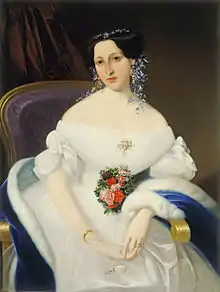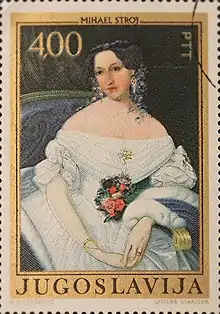Luiza Pesjak
Luiza Pesjak or Lujiza Pesjakova (June 12, 1828 – March 31, 1898) was a Slovene writer, poet and translator. She was the first woman to write a novel in Slovene.[1]
Luiza Pesjak | |
|---|---|
 | |
| Born | June 12, 1828 Ljubljana |
| Died | March 31, 1898 Ljubljana |
| Nationality | Austria-Hungary |
Biography
Pesjak was born Alojzija Crobath in Ljubljana on 12 June 1828 as the daughter of lawyer Blaž Crobath. She was educated in the Fröhlich Institute and by local teachers, including France Prešeren. Pesjak was acquainted with Stritar, Gregorčič and Levstik with whom she exchanged correspondence. Pesjak spend a considerable time invested in reading, going to the theater and opera as well as traveling and being social. She was one of Slovenia's early novelists, producing the story Beata's diary in 1887 as well as writing poetry, plays and the opera libretto for Gorenjski slavček. Pesjak included a strong patriotic message into her works. She was published in both Slovenia and Germany. Notably her first works were in German as at that time she didn't speak Slovene.[2][3][4][5][6][7]
Pesjak was married in 3 October 1848 to the entrepreneur Simon Pesjak. They had five daughters, Helena, Louise, Mary, Ida, and Emma. Though the family spoke German and French, the girls got a local teacher after the introduction of a constitution granting civil and political liberties in the Austrian Empire in 1860 and it was after this that Pesjak learned Slovene and began to write in the language. She began to promote the learning of the local language and to translate poems into it. She translated works in German, English, Italian, Czech and French. She was published in a number of journals. It took ten years for Pesjak to get her diary novel published with her conditions but eventually she succeeded in 1887. In later life her financial stability decreased and Pesjak lived in restricted means almost forgotten. In 1897 she had a stroke while in Podbrezje and died in March 1898.[3][6][8][9]

A street was named for her, though the name was given in a German form, Luiza Pesjakova, and she was featured on a Yugoslavian stamp. Her portrait is in the National Gallery of Slovenia where it is one of the most popular pictures.[10][11][6]
Biobliography
- Songs
- What I Love (1864)
- Violets (1885)
- Prose
- Father's Love (1864)
- Dragotin (1864)
- Rachel (1870)
- Beata's Diary (1887)
- Drama
- Svitoslav Zajcek (1865)
- Slovenia Guide (1866)
- In Koprivnik (1872)
- Opera libretto
- Gorenjski slavček (1872)
- Autobiography
- From my childhood (1886)
References
- Tonra, Justin. "Distant Reading Recommends: Beatin dnevnik (Beata's Diary) by Luiza Pesjak. – Distant Reading for European Literary History".
- "Uspel življenjski načrt Luize Pesjak". Dnevnik (in Slovenian). 2019-10-06. Retrieved 2020-07-06.
- Slovenska akademija znanosti. "Pesjakova, Luiza (1828–1898)". Slovenska biografija (in Slovenian). Retrieved 2020-07-06.
- "Aforizmi". dLib.si (in Bosnian). Retrieved 2020-07-06.
- "Pripovedna besedila slovenskih pisateljic - sodobnic Zofke Kveder". dLib.si (in Slovenian). Retrieved 2020-07-06.
- "Prvi interaktivni multimedijski portal, MMC RTV Slovenija". RTVSLO.si (in Slovenian). 2012-06-17. Retrieved 2020-07-06.
- "Luiza Pesjakova". lit.ijs.si.
- De Haan, F.; Bucur, M.; Daskalova, K. (2008). Aspasia: The International Yearbook of Central, Eastern, and Southeastern European Women's and Gender History. Berghahn Books, Incorporated. p. 33. ISBN 978-1-84545-634-4. Retrieved 2020-07-06.
- Petrović, J. (2018). Women's Authorship in Interwar Yugoslavia: The Politics of Love and Struggle. Springer International Publishing. p. 117. ISBN 978-3-030-00142-1. Retrieved 2020-07-06.
- "National Gallery of Slovenia". National Gallery of Slovenia. 2020-06-15. Retrieved 2020-07-06.
- "Razstava za Bežigradom: od 1623 ulic v Ljubljani le 48 poimenovanih po ženskah". Dnevnik (in Slovenian). 2017-02-10. Retrieved 2020-07-06.